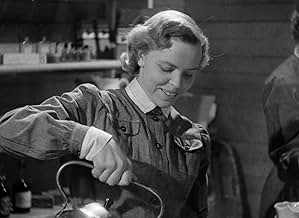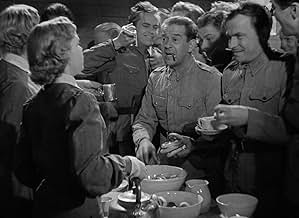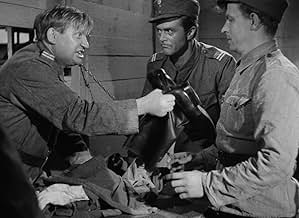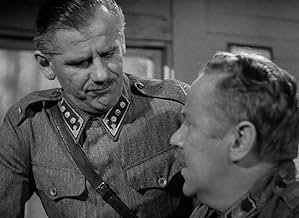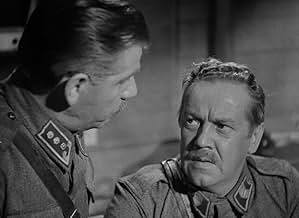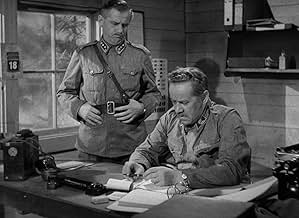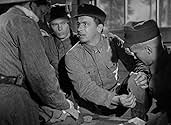Tuntematon sotilas
- 1955
- 2 घं 57 मि
IMDb रेटिंग
8.0/10
8 हज़ार
आपकी रेटिंग
अपनी भाषा में प्लॉट जोड़ेंThe tale of a platoon of soldiers during the Continuation War. Based on Väinö Linna's book of the same name.The tale of a platoon of soldiers during the Continuation War. Based on Väinö Linna's book of the same name.The tale of a platoon of soldiers during the Continuation War. Based on Väinö Linna's book of the same name.
- 1 BAFTA अवार्ड के लिए नामांकित
- 7 जीत और कुल 1 नामांकन
फ़ीचर्ड समीक्षाएं
Tuntematon sotilas (The Unknown Soldier), based on Väinö Linna's novel, is the most succeeded domestic movie in Finland. It's easy to understand how it has gained such a high position.
The direction of Edvin Laine shows all that is essential and transitions between scenes work because of authentic war film material. Music does its purpose and serves patriotic positive atmosphere, especially Jean Sibelius' Finlandia hymn is impressive. Some hilarious comments make smile besides of dark subject. Sound effects have however gotten old-fashioned, especially the voice of bouncing bullets from old westerns is extremely unrealistic.
There's lots of strong performances in Tuntematon sotilas, Heikki Savolainen's delighted Hietanen, Leo Riuttu's funny Vanhala and Jussi Jurkka's swaggering Lammio are only few examples. Although the actors are professionals and superstars of their time most of them are way too old to be their young role characters. Especially Olavi Ahonen's middle-aged timid Riitaoja didn't make positive impact. Also some of the actors die too theatrically.
The script of the movie is good but it presumes too much that all of the viewers have read the novel. For example most of the characters names are not mentioned at all or are only mentioned in the near of the end of their lives. Mostly the only way for those who haven't read the novel to recognize the characters is to recognize the actors who are playing them. Also some aspects of the book witch emphasize the Continiuty War's violent and absurd points, like insane Viirilä, are completely left off, which little dims the novel's strong antiwar message. The only significant error in Tuntematon sotilas is that it's too much a prisoner of its time.
In any case, Tuntematon sotilas is still worth of watching because of it's impressive narration, atmosphere and characters, even though the movie doesn't feel as fresh as 52 years ago.
The direction of Edvin Laine shows all that is essential and transitions between scenes work because of authentic war film material. Music does its purpose and serves patriotic positive atmosphere, especially Jean Sibelius' Finlandia hymn is impressive. Some hilarious comments make smile besides of dark subject. Sound effects have however gotten old-fashioned, especially the voice of bouncing bullets from old westerns is extremely unrealistic.
There's lots of strong performances in Tuntematon sotilas, Heikki Savolainen's delighted Hietanen, Leo Riuttu's funny Vanhala and Jussi Jurkka's swaggering Lammio are only few examples. Although the actors are professionals and superstars of their time most of them are way too old to be their young role characters. Especially Olavi Ahonen's middle-aged timid Riitaoja didn't make positive impact. Also some of the actors die too theatrically.
The script of the movie is good but it presumes too much that all of the viewers have read the novel. For example most of the characters names are not mentioned at all or are only mentioned in the near of the end of their lives. Mostly the only way for those who haven't read the novel to recognize the characters is to recognize the actors who are playing them. Also some aspects of the book witch emphasize the Continiuty War's violent and absurd points, like insane Viirilä, are completely left off, which little dims the novel's strong antiwar message. The only significant error in Tuntematon sotilas is that it's too much a prisoner of its time.
In any case, Tuntematon sotilas is still worth of watching because of it's impressive narration, atmosphere and characters, even though the movie doesn't feel as fresh as 52 years ago.
Tuntematon sotilas (The Unknown Soldier) is an epic story and part of Finland's history. The movie is based on famous Finnish novel by Väinö Linna, and it is set in the Continuation War (1941-44), just about a year after the Winter War, between Finland and Soviet Union. The movie is fully black and white.
The Unknown Soldier focuses on a very diverse group of soldiers and is packed with black humour. The different Finnish dialects, that make a huge part of the fun in the jokes, are understandable only for people who know Finnish, but the overall feeling is there in the amazing acting by Reino Tolvanen (Rokka), Kosti Klemelä (Koskela) and Pentti Siimes (Määttä) - to name a few. The most powerful scene is probably the one where Lehto, Määttä and Rahikainen are stubbornly serving their disciplinary duty after refusing to obey their superiors - directly under the enemy aerial fire.
The Unknown Soldier is one of the most realistic war movies ever made. It shows the horrible facts: people die for their home land and it's not pretty. The Finnish soldiers fight against the tenfold enemy in impossible situations. They made heroic acts in their attempt to save their country, and many of these acts have been captured brilliantly in the movie as well. But the true fact of war - death - is always around, even among the war heroes. War does not make one great.
The teaching of The Unknown Soldier is that even a small country has a chance in war against an impossible enemy if the will to protect the homeland is strong enough, the people are stubborn enough and are ready to die for freedom.
The main music in the film - Jean Sibelius' Finlandia is legendary.
The Unknown Soldier focuses on a very diverse group of soldiers and is packed with black humour. The different Finnish dialects, that make a huge part of the fun in the jokes, are understandable only for people who know Finnish, but the overall feeling is there in the amazing acting by Reino Tolvanen (Rokka), Kosti Klemelä (Koskela) and Pentti Siimes (Määttä) - to name a few. The most powerful scene is probably the one where Lehto, Määttä and Rahikainen are stubbornly serving their disciplinary duty after refusing to obey their superiors - directly under the enemy aerial fire.
The Unknown Soldier is one of the most realistic war movies ever made. It shows the horrible facts: people die for their home land and it's not pretty. The Finnish soldiers fight against the tenfold enemy in impossible situations. They made heroic acts in their attempt to save their country, and many of these acts have been captured brilliantly in the movie as well. But the true fact of war - death - is always around, even among the war heroes. War does not make one great.
The teaching of The Unknown Soldier is that even a small country has a chance in war against an impossible enemy if the will to protect the homeland is strong enough, the people are stubborn enough and are ready to die for freedom.
The main music in the film - Jean Sibelius' Finlandia is legendary.
I haven't ever heard such incomprehensible gibberish in my life. The Unknown Soldier (Tuntematon Sotilas) is not Soviet propoganda but a poignant and still very relevant look at the inhumanity of war. It is probably the only film that takes place during the little known Continuation War (1941-44), the sequel to the also little known Winter War (1939-40). Unlike Talvisota, the other great Finnish war movie, some knowledge of the chronology and background to this conflict is required. In 1941, Finland mobilized its forces along the 1940 armistice line incurring the wrath of the Soviet Union which bombed several Finnish cities in response. Operation Barbarossa, the German invasion of the Soviet Union, began shortly after. With most Soviet forces tied down in defending the motherland against the Germans, Finland seized the opportunity and reoccupied the land it had lost in the previous war. The plucky Finns made significant gains until the war entered its 'static phase' with neither side giving or taking any ground for nearly 2 years. The Finns did, however, refuse to link up with the Germans at Stalingrad which consequently may have cost Germany (and Finland) the war. There was a color remake of this film but in my opinion, this appears to be the superior version. If you can get a copy of the novel in English, I would recommend reading that as well.
Over the decades, Väinö Linna's The Unknown Soldier (1954) has become one of the most popular and beloved Finnish novels of all time, despite initial criticism and controversy about the naturalistic and gritty portrayal of the soldiers' life on the front. When the book was understandably very quickly adapted to the big screen, the directing duties were given to Edvin Laine who would later go on to direct the film adaptations of Linna's epic novel trilogy Here Under the North Star as well. Like the book, the film has become one of the cornerstones of Finnish fiction: the film is shown on television every Independence Day and the book is widely read in schools. Having read the novel twice and seen the movie several times, I can confirm that their classic reputations are very much deserved.
Set during the Continuation War (1941-44), The Unknown Soldier tells the story of a machine gun company consisting mostly of young inexperienced men from all around Finland. At the beginning, the drafted men cheerily leave for the front when the war between Finland and the USSR breaks out again after the brief Interim Peace era. Gradually they grow more and more disillusioned with their chances of ever winning the war and a grudge against the strict commanding officers grows among the company. Battle after battle old friends are killed and new soldiers brought to the front, but the men have only their own spirit to trust.
The character gallery is too numerous to be listed entirely, but all the soldiers have their place in the story and many have become commonly referenced archetypes of different types of Finnish men. It is difficult for me to pick my favourites among them, but the most essential ones include at least Antti Rokka (Reino Tolvanen), an older and very skilled soldier with an anti-authoritarian attitude, Koskela (Kosti Klemelä), a calm and respected platoon leader, and the highly uptight and often ridiculed company commander Lammio (Jussi Jurkka). Particularly Rokka has reached a legendary status in Finnish culture; his rich Karelian dialect, self-confident antics and superior skills mix excellently into an extremely entertaining and often laugh-out-loud funny character. On the other hand, Koskela and Lammio can be seen as the two opposites of leader types; in their personas, practical and theoretical approaches to leadership often clash, even if Koskela would prefer his men to not constantly provoke his superiors' anger.
At the risk of the review becoming too list-like, I cannot leave some other great characters without a mention. The personalities range from the always cheery Vanhala and Hietanen (Leo Riuttu and Heikki Savolainen) to the brooding and menacing Lehto and Lahtinen (Åke Lindman and Veikko Sinisalo), the frightened Riitaoja (Olavi Ahonen), the hilariously eccentric Honkajoki (Tarmo Manni), the business-savvy Rahikainen (Kaarlo Halttunen) and the idealistic Kariluoto (Matti Ranin). The men's diverse dialects are probably mostly lost in translation, but for Finnish-speaking viewers they provide one of the main charms of the whole film; personally I enjoy especially Rokka and Rahikainen's wide Karelian way of speech. Despite the excellent performances, I have to agree with the common criticism against the film: a lot of the actors are obviously too old for their roles and subsequently their behaviour seems overly juvenile at many points. Also, due to this the young men's age difference to the experienced Rokka is not as clear as it is said to be. The age issue does not ruin the experience though, not at all; most of the veteran actors handle their roles magnificently. The memorable performances also help the viewer to distinguish the characters from each other, as the downside of having a large cast is that the film may seem difficult to follow to those who have not read the book.
Like many screen-versions of famous novels, the film downplays the importance of the characters' inner thoughts and focuses more on the action-driven plot which is followed pretty faithfully even though some characters and subplots have been dropped. I especially wish the sadistic relationship of Lehto and Riitaoja was paid more attention in the film as it has always been one of my favourite aspects of the novel, but luckily the spectacular action scenes make up for the thinner characters. The explosions, weaponry, artillery and tanks look very authentic, making especially the final crescendo of chaotic turmoil very impressive. Many other iconic moments also belong among the most famous scenes in Finnish cinema: Lehto's big solution, Rokka single-handedly taking down dozens of Russians with a submachine gun, the tragic demise of one of the main characters in a burning ambulance... However, many of the smaller death scenes have come to look rather theatrical and oddly bloodless by modern standards. In any case, the character chemistry is excellent, thanks to Linna's writing and the charismatic actors.
Jean Sibelius' Finlandia beautifully bookends the visually gorgeous masterpiece that never feels boring despite the runtime of nearly three hours – both entertaining and serious, The Unknown Soldier belongs without a doubt among the most essential of Finnish films ever made.
Set during the Continuation War (1941-44), The Unknown Soldier tells the story of a machine gun company consisting mostly of young inexperienced men from all around Finland. At the beginning, the drafted men cheerily leave for the front when the war between Finland and the USSR breaks out again after the brief Interim Peace era. Gradually they grow more and more disillusioned with their chances of ever winning the war and a grudge against the strict commanding officers grows among the company. Battle after battle old friends are killed and new soldiers brought to the front, but the men have only their own spirit to trust.
The character gallery is too numerous to be listed entirely, but all the soldiers have their place in the story and many have become commonly referenced archetypes of different types of Finnish men. It is difficult for me to pick my favourites among them, but the most essential ones include at least Antti Rokka (Reino Tolvanen), an older and very skilled soldier with an anti-authoritarian attitude, Koskela (Kosti Klemelä), a calm and respected platoon leader, and the highly uptight and often ridiculed company commander Lammio (Jussi Jurkka). Particularly Rokka has reached a legendary status in Finnish culture; his rich Karelian dialect, self-confident antics and superior skills mix excellently into an extremely entertaining and often laugh-out-loud funny character. On the other hand, Koskela and Lammio can be seen as the two opposites of leader types; in their personas, practical and theoretical approaches to leadership often clash, even if Koskela would prefer his men to not constantly provoke his superiors' anger.
At the risk of the review becoming too list-like, I cannot leave some other great characters without a mention. The personalities range from the always cheery Vanhala and Hietanen (Leo Riuttu and Heikki Savolainen) to the brooding and menacing Lehto and Lahtinen (Åke Lindman and Veikko Sinisalo), the frightened Riitaoja (Olavi Ahonen), the hilariously eccentric Honkajoki (Tarmo Manni), the business-savvy Rahikainen (Kaarlo Halttunen) and the idealistic Kariluoto (Matti Ranin). The men's diverse dialects are probably mostly lost in translation, but for Finnish-speaking viewers they provide one of the main charms of the whole film; personally I enjoy especially Rokka and Rahikainen's wide Karelian way of speech. Despite the excellent performances, I have to agree with the common criticism against the film: a lot of the actors are obviously too old for their roles and subsequently their behaviour seems overly juvenile at many points. Also, due to this the young men's age difference to the experienced Rokka is not as clear as it is said to be. The age issue does not ruin the experience though, not at all; most of the veteran actors handle their roles magnificently. The memorable performances also help the viewer to distinguish the characters from each other, as the downside of having a large cast is that the film may seem difficult to follow to those who have not read the book.
Like many screen-versions of famous novels, the film downplays the importance of the characters' inner thoughts and focuses more on the action-driven plot which is followed pretty faithfully even though some characters and subplots have been dropped. I especially wish the sadistic relationship of Lehto and Riitaoja was paid more attention in the film as it has always been one of my favourite aspects of the novel, but luckily the spectacular action scenes make up for the thinner characters. The explosions, weaponry, artillery and tanks look very authentic, making especially the final crescendo of chaotic turmoil very impressive. Many other iconic moments also belong among the most famous scenes in Finnish cinema: Lehto's big solution, Rokka single-handedly taking down dozens of Russians with a submachine gun, the tragic demise of one of the main characters in a burning ambulance... However, many of the smaller death scenes have come to look rather theatrical and oddly bloodless by modern standards. In any case, the character chemistry is excellent, thanks to Linna's writing and the charismatic actors.
Jean Sibelius' Finlandia beautifully bookends the visually gorgeous masterpiece that never feels boring despite the runtime of nearly three hours – both entertaining and serious, The Unknown Soldier belongs without a doubt among the most essential of Finnish films ever made.
The movie is based on a brilliant and realistic book (Unknown soldier) about the "Continuation War" between Finland and Soviet Union from 1941 to 1944.
After the initial fast attack phase the war turns into sleepy trench warfare (1942-44), then (1944)the company has to retreat and finally stop the storming Red Army forces. There exists a wide spectrum of characters from cowards to heroes, from peasant rank-and-file soldiers to cocky officers. The scale in personalities and changing situations of war, which are credibly described, makes the movie a spectacle.
It helps a lot if one knows some of the underlying history, but the story is rather universal tale of the cruelty of war and the men who have to live and die for their country and different motives. The language with dialects is versatile, but in Finnish only. This old version (1955) is in my opinion better than the later one (1985).
After the initial fast attack phase the war turns into sleepy trench warfare (1942-44), then (1944)the company has to retreat and finally stop the storming Red Army forces. There exists a wide spectrum of characters from cowards to heroes, from peasant rank-and-file soldiers to cocky officers. The scale in personalities and changing situations of war, which are credibly described, makes the movie a spectacle.
It helps a lot if one knows some of the underlying history, but the story is rather universal tale of the cruelty of war and the men who have to live and die for their country and different motives. The language with dialects is versatile, but in Finnish only. This old version (1955) is in my opinion better than the later one (1985).
क्या आपको पता है
- ट्रिवियाThe film has been traditionally shown on TV in Finland every year on Independence Day (December 6) since the year 2000.
- कनेक्शनEdited into Juoksuhaudantie (2004)
- साउंडट्रैकFinlandia
by Jean Sibelius
टॉप पसंद
रेटिंग देने के लिए साइन-इन करें और वैयक्तिकृत सुझावों के लिए वॉचलिस्ट करें
- How long is The Unknown Soldier?Alexa द्वारा संचालित
विवरण
बॉक्स ऑफ़िस
- बजट
- FIM 4,66,67,761(अनुमानित)
- चलने की अवधि2 घंटे 57 मिनट
- रंग
- पक्ष अनुपात
- 1.37 : 1
इस पेज में योगदान दें
किसी बदलाव का सुझाव दें या अनुपलब्ध कॉन्टेंट जोड़ें


